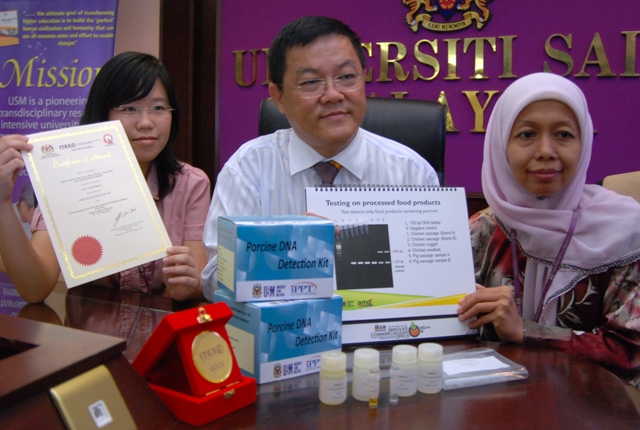PORCINE DNA KIT BENEFITS THE HALAL INDUSTRY

PENANG, 21 May 2013 - The success of a group of researchers from Universiti Sains Malaysia (USM) in producing a kit for detecting the presence of porcine DNA in meat or processed foods is believed to be able to benefit the country's halal industry.
Lead researcher, Assoc. Prof. Dr. Tang Thean Hock said that the latest innovation which is known as Porcine DNA Detection Kit is able to detect the presence of porcine constituents in food through the multiplex PCR technique within a period of not more than 11 hours.
According to him, multiplex PCR is a technique that is able to multiply the number of deoxyribonucleic acid (DNA) sequences in order to detect the porcine presence and it produces results that are highly accurate, precise, sensitive and specific.
“This kit also has other advantages, including a much cheaper production cost compared to the market price, having internal control test as a quality control for reliable test results and it serves as a 2-in-1 kit.
“This means that apart from obtaining accurate results, a test using this kit also includes a simple and dependable method of DNA extraction that is not available in existing products in the market,” he said.
He said this at a special press conference to introduce USM research products, chaired by Deputy Vice-Chancellor for Research and Innovation, Prof. Muhamad Jantan here today.
Tang also emphasised that the product which was developed with two other researchers, Siti Aminah Ahmed and Lee Li Pin, is estimated to be produced at a cost as low as RM500 to test up to 50 samples.
“This Porcine DNA Detection Kit is suitable to be used by the halal certification agency and food inspection agencies such as Standard and Industrial Research Institute of Malaysia (SIRIM) and other similar agencies around the world,” he said.
He added that this innovation that won a gold medal in the 24th International Invention, Innovation and Technology Exhibition (ITEX 2013) is also able to reduce operating costs in the halal certification process currently used by the authorities.
“The authorities usually send a sample to the chemistry department to be tested using the mass spectrometer which operates basing on chemical tests which is far more expensive. However, this kit that we are working on, is based on biological tests and it can save cost,” he said.
Commenting on the measures taken to commercialise the product, he said that until now there are some authorities in the industry who have expressed their desire to collaborate but all of them are still in the discussion stage. - Text: Marziana Mohamed Alias/Photo: Mohd Fairus Md Isa/Translation: Yong Check Yoon
- Created on .
- Hits: 3132
